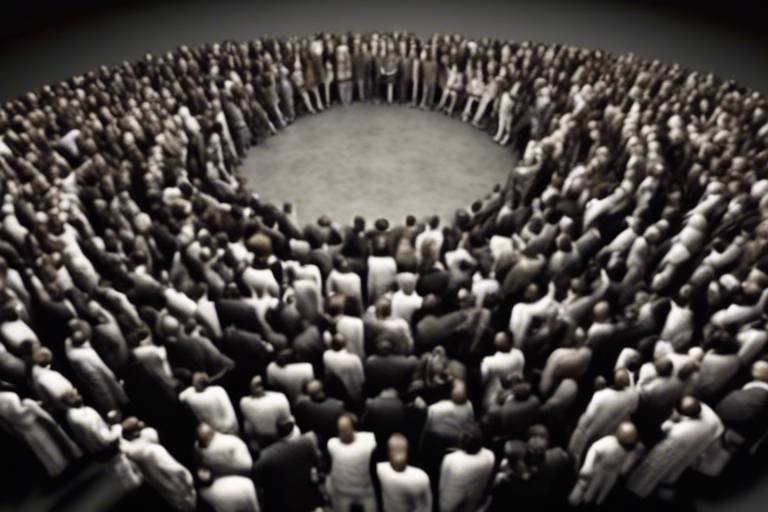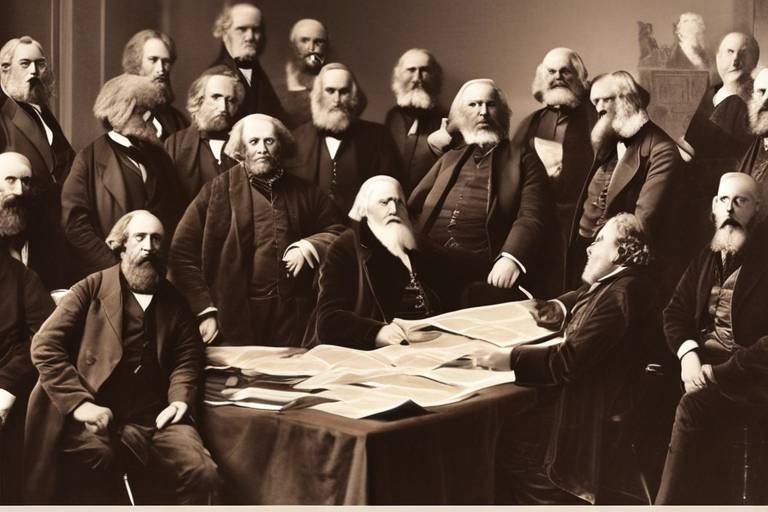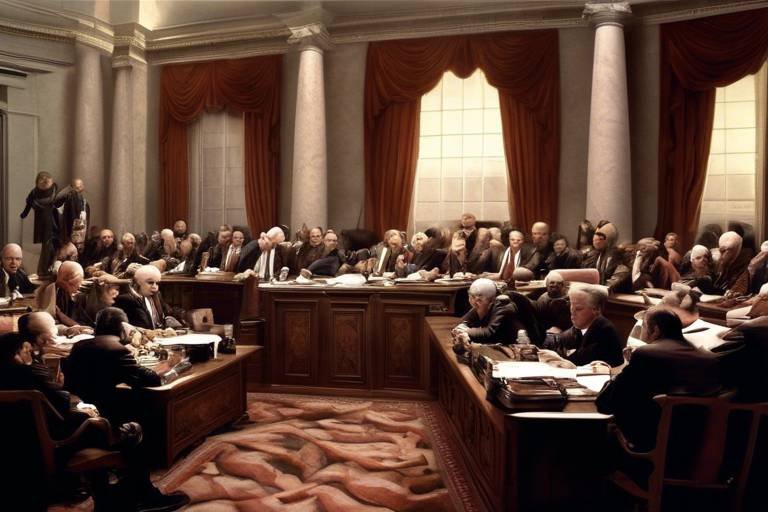The Philosophy of Social Networks and their Political Role
In today's digital age, social networks have evolved into more than just platforms for sharing photos or connecting with friends. They have become the backbone of modern political discourse, influencing how we perceive issues, engage with each other, and ultimately, how we vote. The intersection of social media and politics is a fascinating realm that raises questions about the very nature of democracy itself. Are we truly informed citizens, or are we merely products of the algorithms that dictate what we see and hear?
As we navigate this complex landscape, it’s essential to understand that social networks are not neutral spaces. They are intricately designed environments that can either foster healthy debate or deepen divisions. The philosophy of social networks encompasses a myriad of elements, from the design of the platforms to the motivations behind user engagement. Each click, like, and share can either amplify a message or drown it out, creating a dynamic where the loudest voices often dominate the conversation.
Moreover, the role of social networks in politics extends beyond mere communication. They serve as powerful tools for mobilization, enabling grassroots movements to gain traction and challenge established political norms. Think about it: a single tweet can spark a global movement, while a viral video can change the course of an election. This capacity for rapid dissemination of information has transformed how political campaigns are run, making it easier for candidates to reach potential voters and for citizens to rally around causes.
However, with great power comes great responsibility. The ethical implications of social networks in the political sphere cannot be overstated. We must ask ourselves: how do we ensure that these platforms are used to promote truth and transparency rather than misinformation and manipulation? The answer lies in a combination of user awareness, regulatory measures, and the ongoing efforts of fact-checking organizations that strive to uphold the integrity of information shared online.
In this article, we will delve deeper into the various aspects of social networks and their political role, exploring their evolution, impact on political engagement, the ethics of political advertising, and the challenges posed by algorithmic biases. By understanding these elements, we can better navigate the digital landscape and engage in more informed discussions about the future of democracy in a world increasingly shaped by social media.
- How do social networks influence public opinion?
Social networks shape public opinion by controlling the flow of information, allowing certain narratives to gain traction while others are suppressed. - What are filter bubbles?
Filter bubbles occur when algorithms curate content that aligns with a user's existing beliefs, limiting exposure to diverse perspectives. - Why is fact-checking important in political advertising?
Fact-checking ensures that voters receive accurate information, helping to combat misinformation and uphold the integrity of elections.

The Evolution of Social Networks
Understanding the historical context of social networks reveals their transformation from simple communication tools to powerful platforms that shape political discourse and public engagement. Initially, social networks emerged as rudimentary platforms, primarily serving the purpose of connecting individuals. Think of early platforms like Friendster and MySpace—they were like digital meeting spots where friends could catch up, share photos, and express themselves. However, as technology advanced and mobile devices became ubiquitous, the landscape of social networking began to shift dramatically.
With the launch of Facebook in 2004, we witnessed a seismic change. This platform didn't just connect friends; it opened the floodgates for public sharing and engagement on a massive scale. Suddenly, individuals could broadcast their thoughts and ideas to a global audience, and this newfound power laid the groundwork for social media's political role. The ability to share information quickly and widely transformed how we perceive and engage with politics. It was no longer just about the news on TV or in print; people began to turn to their social feeds for real-time updates and opinions.
As social networks evolved, they began to incorporate features that encouraged political engagement. Platforms introduced tools for users to express their political views, organize events, and rally support for causes. For instance, Twitter emerged as a microblogging platform where users could share their thoughts in 280 characters or less, leading to the rise of hashtags that could unify voices around specific political issues. This was revolutionary! It allowed individuals to participate in political discourse without needing to be part of the traditional media landscape.
However, the evolution of social networks didn't come without its challenges. The very features that encouraged engagement also led to the spread of misinformation. As users began to curate their feeds, they often found themselves in echo chambers—environments where their existing beliefs were reinforced, and opposing viewpoints were minimized. This phenomenon is crucial to understanding how social networks can both empower and polarize political discourse.
Moreover, the algorithms that power these platforms play a significant role in shaping the information users encounter. Think of algorithms as the invisible hands guiding what you see on your feed; they determine which posts are prioritized based on your interactions. This can create a skewed perception of reality, where users may believe their views are more widely held than they actually are. In essence, social networks have transitioned from simple communication tools to complex ecosystems that influence political engagement in profound ways.
In summary, the evolution of social networks is a fascinating journey from personal communication to a pivotal role in political discourse. As these platforms continue to develop, they will undoubtedly shape the future of politics, making it essential for us to understand their impact on society. The next time you scroll through your feed, consider the power of those tiny squares of text and images—they're not just posts; they're shaping the democratic process in real-time.

The Impact of Social Media on Political Engagement
Social media has fundamentally transformed the way individuals engage with politics. Gone are the days when political discussions were confined to dinner tables or town halls; now, they unfold in real-time on platforms like Twitter, Facebook, and Instagram. Imagine a bustling marketplace where ideas, opinions, and debates are exchanged at lightning speed. This vibrant digital space has not only democratized information but has also empowered ordinary citizens to become active participants in the political process.
One of the most significant impacts of social media is the unprecedented access to information it provides. Users can easily share and receive news updates, political analyses, and grassroots campaigns with just a few clicks. This accessibility fosters a more informed electorate, enabling individuals to make decisions based on a wide range of perspectives rather than relying solely on traditional media outlets. However, this wealth of information comes with its own set of challenges. With so many voices vying for attention, it can be difficult to discern credible sources from misinformation, leading to confusion and distrust.
Moreover, social media has become a powerful tool for activism. Movements like #BlackLivesMatter and #MeToo gained momentum largely due to their presence on social platforms. These hashtags have not only raised awareness but have also mobilized supporters to take action, whether it be attending protests, signing petitions, or donating to related causes. The ability to organize events and spread awareness rapidly has made social media an indispensable tool for grassroots movements. In fact, studies have shown that social media campaigns can significantly increase participation in political activities. For instance:
| Campaign | Platform Used | Outcome |
|---|---|---|
| #BlackLivesMatter | Twitter, Facebook | Increased awareness and participation in protests |
| #MeToo | Instagram, Twitter | Global conversations on sexual harassment and assault |
| March for Our Lives | Facebook, Instagram | Mobilized youth for gun control advocacy |
However, the impact of social media on political engagement extends beyond mere information and activism. It has also changed how political campaigns operate. Candidates now utilize social media to connect directly with voters, bypassing traditional media gatekeepers. This direct line of communication allows politicians to craft their message in real-time, respond to public sentiment, and engage with constituents on a personal level. It’s akin to having a one-on-one conversation with a candidate, breaking down barriers that once existed between politicians and the public.
Yet, this shift also raises concerns about the authenticity of political engagement. With the rise of targeted advertising and algorithm-driven content, the political landscape can become a battleground for misinformation and manipulation. Political messages are often tailored to resonate with specific demographics, which can lead to an echo chamber effect. This phenomenon occurs when individuals are exposed primarily to viewpoints that align with their own, limiting their understanding of opposing perspectives and contributing to societal polarization.
In conclusion, social media has undeniably reshaped political engagement, providing tools for information dissemination, activism, and direct communication between politicians and voters. However, as we navigate this new landscape, it is essential to remain vigilant about the challenges it presents, including misinformation and the potential for polarization. The future of political engagement will depend on our ability to harness the power of social media responsibly and ethically.
- How has social media changed political campaigns? Social media allows candidates to connect directly with voters, share their messages in real-time, and respond to public sentiment without the filter of traditional media.
- What are the risks associated with social media in politics? Risks include the spread of misinformation, the creation of echo chambers, and the potential for manipulation through targeted advertising.
- Can social media really mobilize people for political causes? Yes, social media has proven to be an effective tool for mobilizing support for various movements, enabling rapid organization and awareness-raising.

The Role of Algorithms in Political Discourse
In the digital age, algorithms have become the unseen architects of our online experiences, particularly in the realm of political discourse. These complex sets of rules and calculations determine what content we see on social media platforms, shaping our understanding of current events and influencing our political opinions. Imagine walking into a library where the librarian only shows you books that align with your existing beliefs—this is what algorithms do for us online. They curate our feeds, presenting information that often reinforces our views while filtering out dissenting perspectives.
One of the most significant implications of algorithm-driven content is the way it can create echo chambers. In these environments, users are primarily exposed to ideas and opinions that mirror their own, leading to a distorted perception of reality. This phenomenon can be particularly dangerous during election cycles or political crises when a well-informed electorate is crucial for a functioning democracy. The algorithms prioritize engagement over balance, meaning sensational or emotionally charged content often rises to the top, regardless of its factual accuracy.
Moreover, the impact of algorithms extends beyond mere information consumption; they actively shape the political landscape. For instance, during the 2016 U.S. presidential election, social media platforms were criticized for allowing the spread of misinformation. A recent study highlighted that false information is 70% more likely to be retweeted than true information. This raises questions about the ethical responsibilities of social media companies in moderating content and ensuring that users have access to accurate information.
Additionally, algorithms are not neutral. They can exhibit algorithmic bias, favoring certain narratives while suppressing others. This bias can stem from various factors, including the data used to train these algorithms and the inherent biases of their creators. For example, if an algorithm is trained on data that predominantly features one political perspective, it may inadvertently prioritize that viewpoint in users' feeds. This can lead to a skewed understanding of political issues and contribute to the polarization of society.
To illustrate the influence of algorithms on political discourse, consider the following table that outlines the key aspects of algorithmic impact:
| Aspect | Description |
|---|---|
| Content Curation | Algorithms determine what news and posts appear in users' feeds based on their previous interactions. |
| Echo Chambers | Users are more likely to engage with content that aligns with their beliefs, leading to a lack of exposure to diverse opinions. |
| Algorithmic Bias | Algorithms can unintentionally favor certain narratives, affecting public perception and political polarization. |
| Misinformation Spread | False information can spread rapidly due to algorithmic prioritization of engagement over accuracy. |
As we navigate this complex landscape, it's crucial to recognize the power of algorithms in shaping not just our online experiences, but also the very fabric of our democratic processes. Understanding their role allows us to be more critical consumers of information and encourages us to seek out diverse viewpoints. After all, in a world where algorithms dictate our news feeds, the responsibility lies with us to break free from the confines of our echo chambers and engage in meaningful political discourse.
- What are algorithms? Algorithms are sets of rules or calculations that determine how data is processed and presented, often used by social media platforms to curate content.
- How do algorithms influence political discourse? They shape the information we see, often reinforcing existing beliefs and creating echo chambers that limit exposure to diverse viewpoints.
- What is an echo chamber? An echo chamber is an environment where a person only encounters information or opinions that reflect and reinforce their own.
- What is algorithmic bias? Algorithmic bias occurs when an algorithm produces results that are systematically prejudiced due to the data it was trained on or the design choices made by its creators.

The Creation of Filter Bubbles
In the vast ocean of information that social networks provide, the concept of filter bubbles emerges as a significant concern. Imagine being in a room where every sound reflects your own voice, echoing back your thoughts and beliefs while drowning out any opposing views. This is essentially what happens in a filter bubble. As users engage with social media platforms, algorithms curate content tailored to their preferences, often based on their previous interactions. This personalized approach can create an environment where individuals are predominantly exposed to information that aligns with their existing beliefs, leading to a narrow understanding of the world around them.
The implications of filter bubbles are profound. They not only limit exposure to diverse perspectives but also contribute to a more polarized society. When users are continually fed content that reinforces their views, they become less likely to encounter or engage with differing opinions. This can create a false sense of consensus, where individuals believe that their views are widely shared, further entrenching their beliefs. In essence, filter bubbles can create a cognitive echo chamber, making it increasingly difficult for individuals to engage in constructive dialogue with those holding opposing viewpoints.
To illustrate this phenomenon, consider the following table that highlights how filter bubbles can affect political discourse:
| Aspect | Impact of Filter Bubbles |
|---|---|
| Exposure to Information | Limited to familiar viewpoints, reducing diversity of thought |
| Political Polarization | Increased division between ideological groups |
| Public Discourse | Less constructive dialogue and understanding among individuals |
| Decision Making | Informed by biased information, leading to skewed perceptions |
Moreover, the creation of filter bubbles raises ethical questions about the responsibility of social media platforms. Should they intervene to ensure users are exposed to a broader range of perspectives? Or is it up to individuals to seek out diverse information actively? As we navigate this digital landscape, it becomes crucial for users to be aware of their online habits and consciously seek out differing viewpoints to break free from these bubbles. After all, a well-rounded understanding of the world requires us to step outside our comfort zones and engage with ideas that challenge our beliefs.
In conclusion, while social networks provide incredible opportunities for connection and information sharing, they also pose challenges that can significantly impact our political landscape. Recognizing the existence of filter bubbles is the first step in mitigating their effects, fostering a more informed and engaged citizenry capable of navigating the complexities of modern politics.
- What are filter bubbles? Filter bubbles are situations where users are exposed primarily to information that aligns with their existing beliefs, limiting their understanding of opposing viewpoints.
- How do filter bubbles affect political discourse? They can lead to increased polarization and a lack of constructive dialogue, as individuals may become entrenched in their beliefs.
- Can filter bubbles be avoided? Yes, by actively seeking out diverse perspectives and engaging with a variety of content, users can mitigate the effects of filter bubbles.
- What role do algorithms play in creating filter bubbles? Algorithms curate content based on user interactions, often prioritizing familiar viewpoints and limiting exposure to differing opinions.

Algorithmic Bias and Its Consequences
In the digital age, algorithms are the unseen hands guiding our online experiences, including what we see and engage with on social media. These algorithms, while designed to enhance user experience by personalizing content, can inadvertently introduce algorithmic bias. This bias occurs when the data used to train these algorithms reflects existing societal prejudices or inequalities, leading to skewed representations of reality. Imagine walking into a room where only certain voices are amplified while others are drowned out; that's what algorithmic bias does to our political landscape.
The consequences of algorithmic bias are profound and far-reaching. For instance, during election cycles, biased algorithms can prioritize certain political narratives over others, influencing which candidates gain visibility and support. This can create an uneven playing field, where well-funded campaigns dominate the discourse, while grassroots movements struggle to be heard. The impact is not just on individual campaigns but on the democratic process itself, as voters may only be exposed to a narrow range of perspectives.
Moreover, algorithmic bias can exacerbate polarization in society. When users are consistently shown content that aligns with their existing beliefs, they may become more entrenched in their views, leading to a lack of understanding and empathy for opposing perspectives. This phenomenon is akin to living in a bubble, where the outside world is obscured, and the only voices heard are those that echo one's own. The result? A fragmented society where constructive dialogue becomes increasingly difficult.
To illustrate the impact of algorithmic bias, consider the following table that highlights key areas affected by this issue:
| Area Affected | Description |
|---|---|
| Political Campaigns | Algorithms can favor well-funded campaigns, limiting exposure for less wealthy candidates. |
| Public Opinion | Skewed information can shape public perception, leading to misguided beliefs about candidates and issues. |
| Social Polarization | Reinforcement of existing beliefs can deepen societal divides, making compromise more difficult. |
| Misinformation | Bias in algorithms can lead to the spread of false information, further complicating the political landscape. |
Addressing algorithmic bias is crucial for the health of our democracy. It requires a collective effort from tech companies, policymakers, and users alike. Transparency in how algorithms operate and the data used to train them is essential. Additionally, implementing robust fact-checking mechanisms can help mitigate the spread of misinformation and ensure that all voices are fairly represented in the political discourse. As we navigate this complex digital landscape, it is vital to remain vigilant and advocate for systems that promote equity and inclusivity.
- What is algorithmic bias? Algorithmic bias refers to the systematic and unfair discrimination that can occur when algorithms reflect existing prejudices in the data used to train them.
- How does algorithmic bias affect political discourse? It can skew the visibility of certain political narratives, leading to an uneven playing field and deepening societal polarization.
- What can be done to combat algorithmic bias? Solutions include increasing transparency in algorithm design, implementing fact-checking systems, and promoting diverse data sets for training algorithms.
- Why is addressing algorithmic bias important? It is crucial for ensuring a fair democratic process where all voices are heard and represented equally.

Social Networks as Tools for Political Mobilization
In today's digital age, social networks have emerged as powerful catalysts for political mobilization. Gone are the days when political movements relied solely on traditional media and face-to-face gatherings. Now, a single tweet or Facebook post can ignite a movement, rallying thousands to a cause in mere hours. This transformation is not just about convenience; it’s a profound shift in how we engage with politics and each other.
One of the most significant advantages of social networks is their ability to connect like-minded individuals across geographical boundaries. Imagine a young activist in a small town who, through platforms like Twitter or Instagram, can connect with others who share their passion for climate change, social justice, or any pressing issue. This connectivity fosters a sense of community and urgency, enabling grassroots movements to flourish. For instance, the #MeToo movement gained momentum as individuals shared their stories online, creating a collective voice that demanded attention and change.
Moreover, social networks allow for the rapid dissemination of information. During critical events, such as elections or protests, updates can be shared in real-time, informing supporters and encouraging participation. This immediacy can be crucial; for example, a protest organized through social media can mobilize participants faster than traditional methods ever could. The ability to share videos, images, and live updates means that the narrative can be shaped as events unfold, allowing activists to respond quickly to misinformation or changing circumstances.
However, it's essential to recognize that while social networks can empower political mobilization, they can also present challenges. The oversaturation of information can lead to confusion, making it difficult for individuals to discern credible sources from unreliable ones. This is where the role of fact-checking becomes vital. Ensuring that the information shared is accurate helps maintain the integrity of movements and builds trust among supporters.
Furthermore, the algorithms that govern what we see on our feeds can create a double-edged sword. While they can help amplify messages to the right audiences, they can also limit exposure to diverse viewpoints. This phenomenon can lead to echo chambers, where individuals only engage with information that reinforces their existing beliefs, ultimately hindering the potential for broader political discourse.
In conclusion, social networks are undeniably transformative tools for political mobilization. They offer unprecedented opportunities for connection, information sharing, and grassroots organization. However, with great power comes great responsibility; as users, we must remain vigilant about the information we consume and share. By embracing the potential of these platforms while being aware of their pitfalls, we can work towards a more informed and engaged citizenry.
- How do social networks influence political movements?
Social networks facilitate communication, allowing activists to organize, share information, and mobilize supporters quickly and efficiently. - What are the risks associated with using social media for political mobilization?
Risks include the spread of misinformation, the creation of echo chambers, and potential privacy concerns related to data usage. - Can social networks help in fostering a more informed electorate?
Yes, if used responsibly, social networks can promote fact-checking and the sharing of credible information, contributing to a more informed public.

The Ethics of Political Advertising on Social Media
In today's digital age, the rise of social media has transformed the landscape of political advertising, introducing both opportunities and challenges. The ability to target specific demographics with tailored messages has made political campaigns more efficient, but it also raises significant ethical concerns. How do we ensure that these platforms are used responsibly? What safeguards are in place to protect voters from manipulation? These questions are vital as we navigate the complexities of modern political communication.
One of the primary ethical dilemmas surrounding political advertising on social media is the issue of transparency. Voters deserve to know who is behind the messages they encounter online. Unfortunately, many social media platforms allow for anonymous or pseudonymous accounts, making it difficult to trace the origins of political ads. This lack of transparency can lead to a breach of trust between the electorate and those in power, as individuals may unwittingly support agendas without understanding the motivations behind them.
Moreover, the targeted nature of social media advertising can lead to the potential manipulation of voter behavior. Algorithms analyze user data to deliver highly personalized content, which can sometimes result in misleading narratives being presented as facts. For instance, if a user frequently engages with content that aligns with a particular political ideology, they may be shown ads that reinforce their existing beliefs, effectively creating an echo chamber. This phenomenon not only skews public perception but also raises questions about the ethical implications of exploiting personal data for political gain.
To address these concerns, various countries are implementing regulations and policies governing political ads on social media. These regulations aim to ensure fair practices and protect democratic processes from exploitation. For example, some jurisdictions require that all political ads be clearly labeled, indicating who funded them and what their objectives are. This level of accountability is crucial for maintaining the integrity of democratic elections.
Additionally, the role of fact-checking in online political ads cannot be overstated. Fact-checking organizations work tirelessly to combat misinformation, providing voters with accurate information and context. This is especially important during election seasons when misleading ads can sway public opinion. By promoting transparency and accountability, fact-checkers help uphold the integrity of the electoral process.
In conclusion, while social media has revolutionized political advertising, it also presents significant ethical challenges that must be addressed. As we continue to navigate this new landscape, it is essential to prioritize transparency, accountability, and the integrity of information. Only then can we ensure that social media serves as a tool for democratic engagement rather than a vehicle for manipulation.
- What are the main ethical concerns regarding political advertising on social media?
The primary concerns include transparency, manipulation of voter behavior, and the potential spread of misinformation. - How can voters protect themselves from misleading political ads?
Voters can educate themselves about the sources of information, seek out fact-checking resources, and be critical of the content they consume. - Are there regulations in place for political advertising on social media?
Yes, various countries have implemented regulations requiring political ads to be labeled and disclose their funding sources.

Regulations and Policies Governing Political Ads
As social networks have become the battleground for political discourse, the regulation of political advertising has emerged as a pressing issue. Governing bodies worldwide are grappling with how to ensure that political ads on platforms like Facebook, Twitter, and Instagram are both transparent and accountable. The challenge lies in balancing the freedom of expression with the need to protect democratic processes from manipulation and misinformation.
In the United States, for instance, the Federal Election Commission (FEC) has set forth guidelines that require political advertisers to disclose their funding sources. This means that any ad promoting a political candidate or cause must clearly state who paid for it. Such regulations aim to provide voters with the information they need to make informed decisions. However, the rapid evolution of social media has made it difficult for legislation to keep pace, often leaving loopholes that can be exploited.
Across the Atlantic, the European Union has taken a more stringent approach. The European Commission has proposed new regulations that mandate greater transparency in political advertising. These regulations require platforms to maintain a public database of political ads, detailing who funded them and how much was spent. This initiative is designed to combat the spread of misinformation and ensure that voters are aware of the sources behind the messages they encounter online.
Moreover, countries like Canada and Australia have also introduced their own frameworks to regulate political ads on social media. In Canada, the Canada Elections Act stipulates that political parties must maintain records of their advertising expenses, while in Australia, the Electoral Commission oversees the compliance of political advertising with existing laws. These measures reflect a growing recognition of the need for transparency and accountability in political messaging.
However, the effectiveness of these regulations often hinges on enforcement. Many social media platforms have implemented their own policies to combat misinformation and ensure compliance with local laws. For example, Facebook has established a robust fact-checking system and has partnered with independent organizations to verify the accuracy of political ads. Yet, critics argue that self-regulation is not enough, and that stronger oversight is necessary to safeguard the integrity of democratic processes.
In conclusion, the landscape of political advertising on social media is continually evolving. As regulations and policies adapt to the challenges posed by these platforms, it is crucial for both advertisers and voters to remain vigilant. Understanding the rules governing political ads can empower voters to critically evaluate the information they encounter, fostering a more informed electorate and a healthier democratic process.
- What are the main regulations governing political ads on social media?
Regulations vary by country, but they generally include requirements for transparency regarding funding sources and the disclosure of who paid for the ads.
- How do social media platforms enforce these regulations?
Platforms like Facebook and Twitter have implemented their own policies, including fact-checking systems and partnerships with independent organizations to verify political ad accuracy.
- Are there penalties for violating political ad regulations?
Yes, violations can lead to fines and other penalties, depending on the jurisdiction and the specific regulations that have been breached.

The Role of Fact-Checking in Online Political Ads
In an era where information travels faster than light, the role of fact-checking in online political ads has become more crucial than ever. With social media platforms acting as the primary battleground for political discourse, the potential for misinformation is alarmingly high. Political ads can easily spread like wildfire, often leaving a trail of confusion and misinterpretation in their wake. So, how do we combat this rising tide of falsehoods?
Fact-checking organizations serve as the watchdogs of the digital political landscape. They sift through the myriad of claims presented in political ads, ensuring that what voters see is not just a cleverly crafted narrative, but a representation grounded in truth. These organizations utilize a variety of methods to verify the accuracy of statements made in ads, including:
- Cross-referencing with reputable sources
- Consulting experts in relevant fields
- Analyzing historical data and previous claims
But why is this so important? The impact of misinformation can be profound. Studies have shown that false information can sway public opinion and ultimately influence election outcomes. This is where fact-checkers step in, acting as the guardians of democracy. By providing clear, concise, and accessible information, they empower voters to make informed decisions rather than relying on potentially misleading advertisements.
Moreover, the presence of fact-checking can also act as a deterrent for political candidates and parties. When they know that their statements are subject to scrutiny, there’s a greater chance they will think twice before making dubious claims. This creates a ripple effect, promoting a culture of accountability in political advertising. The relationship between fact-checkers and political ads is akin to a balancing act, where both parties must navigate the tightrope of credibility and persuasion.
However, it’s not all sunshine and rainbows. The fact-checking process can sometimes be criticized for its subjectivity. What one organization deems as false, another might argue is a matter of interpretation. This brings us to the importance of transparency in the fact-checking process. By clearly outlining their methodologies and sources, fact-checking organizations can bolster their credibility and help the public trust their findings.
As we continue to navigate this complex digital landscape, the role of fact-checking in online political ads will only grow more significant. With the increasing sophistication of misinformation tactics, the need for vigilant fact-checking becomes a necessity rather than a choice. It’s a collaborative effort that requires not just the diligence of fact-checkers but also the engagement of the public. After all, informed citizens are the backbone of a thriving democracy.
- What is fact-checking? Fact-checking is the process of verifying the accuracy of statements made in political ads or other media.
- Why is fact-checking important in political advertising? It helps to combat misinformation, ensuring voters are informed and can make educated decisions.
- How do fact-checkers verify claims? They cross-reference claims with reputable sources, consult experts, and analyze data.
- Can fact-checking be biased? While some organizations strive for objectivity, biases can exist, which is why transparency in their methods is crucial.
Frequently Asked Questions
- How have social networks evolved over time?
Social networks have transformed dramatically from their inception as simple communication tools into complex platforms that significantly shape political discourse. Initially, they focused on connecting friends and family, but now they serve as vital arenas for public debate, activism, and political engagement, influencing how we perceive and interact with political issues.
- What is the impact of social media on political engagement?
Social media has revolutionized political participation by providing greater access to information and enabling individuals to engage more actively in political discussions. It has fostered grassroots movements, allowing people to rally around causes and challenge traditional political structures in ways that were previously unimaginable.
- How do algorithms affect political discourse on social networks?
Algorithms play a pivotal role in determining the content users see on social media. They can create echo chambers by reinforcing existing beliefs and limiting exposure to diverse viewpoints, which can distort public perception and contribute to political polarization.
- What are filter bubbles, and how do they influence political opinions?
Filter bubbles occur when users are primarily exposed to information that aligns with their existing views, creating a skewed understanding of the world. This phenomenon can limit critical thinking and reduce empathy for opposing perspectives, ultimately fueling division in political discourse.
- What is algorithmic bias, and what are its consequences?
Algorithmic bias refers to the tendency of algorithms to favor certain narratives or viewpoints over others, which can have serious implications for political campaigns and public trust in democratic institutions. It often leads to the spread of misinformation and can manipulate voter behavior by selectively exposing users to specific content.
- How do social networks facilitate political mobilization?
Social networks are essential for organizing political movements, allowing for the rapid dissemination of information and mobilization of supporters. They enable activists to coordinate efforts during critical events, such as elections and protests, making it easier to rally support and amplify their messages.
- What ethical concerns arise from political advertising on social media?
The rise of targeted political advertising has raised significant ethical questions regarding transparency and accountability. There's a growing concern about the potential manipulation of voter behavior through tailored messaging, which can undermine the integrity of democratic processes.
- What regulations are in place for political advertising on social networks?
Various countries are implementing regulations to govern political advertising on social networks. These regulations aim to ensure fair practices, protect democratic processes from exploitation, and enhance transparency in political messaging.
- What role does fact-checking play in online political ads?
Fact-checking organizations are crucial in combating misinformation in political advertising. They help inform voters by verifying claims made in ads, thereby upholding the integrity of democratic elections and ensuring that individuals can make informed decisions.



















